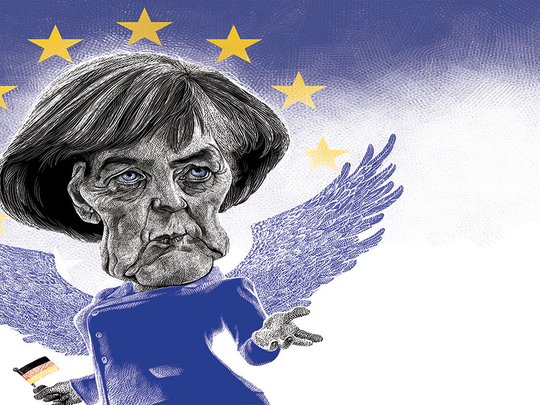
Is it really just seven weeks ago that German Chancellor Angela Merkel was portrayed as a cold-hearted coward for making a poor Palestinian girl cry by telling her she could do nothing to help her family’s claim for refugee status?
In a televised meeting that went viral, Merkel rubs the shoulder of a sobbing teenager after telling her she was one of “thousands and thousands” of refugees that her country was unable to help when she met a group of teens for what should have been a straightforward event in the gymnasium of their school in the northern city of Rostock.
During the discussion, titled ‘Good life in Germany’, Reem, a Palestinian, told Merkel in fluent German that she and her family, who arrived in Rostock from a Lebanese refugee camp four years ago, faced the threat of deportation.
She said: “I have goals like anyone else. I want to study like them ... it’s very unpleasant to see how others can enjoy life and I can’t myself.”
Merkel responded by saying she understood, but that “politics is sometimes hard. You’re right in front of me now and you’re an extremely nice person. But you also know in the Palestinian refugee camps in Lebanon are thousands and thousands and if we were to say you can all come ... we just can’t manage it.”
The chancellor said she hoped the decision-making process, as to which refugees could stay and which must return, would soon be made quicker. But she was forced to stop mid-sentence, and muttered “oh Gott”, on seeing that Reem was crying. She walked up to the girl and started stroking her shoulder, saying: “You were great ... I know it’s difficult for you and you presented extremely well the situation that many others find themselves in.”
Did that event really change Merkel? Something did. In these past seven weeks, Merkel has done a complete U-turn and is now heralded as the champion of refugees, admonishing the rest of Europe for failing to respond adequately to the greatest refugee crisis since the end of the Second World War.
She has thrown open Germany’s doors, expecting 800,000 to apply for asylum this year. Putting it in context — she is increasing Germany’s population by 1 per cent with foreigners who are alien to both German culture and Teutonic tongue.
She has mobilised German towns and cities to find appropriate accommodation for the large numbers of refugees entering the country, most of them via Bavaria in the south. Everything from soldiers’ barracks and empty school buildings to camping sites, shipping containers and sports halls are being used to accommodate them. And Merkel could not be happier.
A quarter of a century ago, she was a divorced 35-year-old chemical physicist living in a Communist state where freedom of expression was strictly ‘verboten’ (forbidden) and politics was as foreign as a McDonald’s hamburger on the other side of the mined and electrified fence that kept East separate from West Germany. That she, over those past 25 years, rose to become leader of the centre-right Christian Democratic Union, was elected Chancellor of a unified Germany — and now looks like to be a shoo-in for her fourth term in 2017 — speaks volumes of the portly short woman with a penchant for sensible shoes, carefully coiffed hair and a uniform of a brightly coloured jacket. And consider too that then, 25 years ago, expressing any political opinion would have landed her in jail with the key tossed in some forgotten corner.
She is cold. Emotionally awkward. Not a natural smoozer. But damn good at what she does.
Under her leadership, Germany took the European Union (EU) and the Eurozone by the scruff of the neck, followed her austere advice and emerged from five years of unprecedented financial chaos with a single currency intact and — even more remarkably given Greece’s recent turmoil — all of the 17 members of the euro intact. Not bad for a block that has only 7 per cent of the global population but 50 per cent of the world’s spending power.
In an ageing country where most Germans either want so desperately to forget about the collective guilt deeply ingrained in their national psyche after Hitler’s national socialism, or have lived under the security blanket of Nato for the past seven decades, Merkel strikes a balance whereby the Berlin government is the de facto power that matters in the EU, yet isn’t seen as a jackbooted-force.
And Merkel is there like a mother — she is known as “Mutti” (mummy) in the German press — offering sage advice and getting things done efficiently, running her Cabinet like she would run her kitchen, with a highly efficient work ethic.
And right now, after organising a crisis summit on the refugee crisis in Brussels on April 14, she is now busy readying beds and meals for nearly a million refugees. Just like any mother would.










